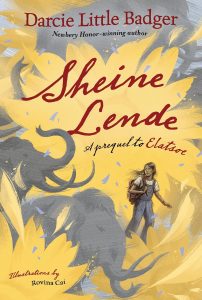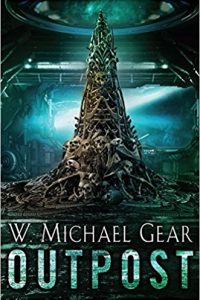Alex Brown Reviews Sheine Lende by Darcie Little Badger
 Sheine Lende, Darcie Little Badger (Levine Querido 978-1-64614-379-5, $19.99. 400pp, hc) April 2024. Cover by Rovina Cai.
Sheine Lende, Darcie Little Badger (Levine Querido 978-1-64614-379-5, $19.99. 400pp, hc) April 2024. Cover by Rovina Cai.
In 2020, Darcie Little Badger had her YA debut with the utterly delightful mystery novel Elatsoe. Ellie, a 17-year-old asexual Lipan Apache teen, lives in a slightly alternate contemporary version of America where legendary creatures and magic are a normal part of life. In particular, she has the ability to call the spirits of the dead from Below, a gift passed down from powerful ancestors. She uses that gift to solve a murder mystery and expose imperial cruelties.
Sheine Lende is the second book in the series but is really a prequel. It centers on Ellie’s grandmother, Shane, who shares the same talent her granddaughter will one day have. She and her mother, Lorenza, track down missing people with the help of the spirit of Lorenza’s beloved hound, Nellie. But when Lorenza and a pair of siblings vanish, Shane will have to rely on her wits and her community to bring them home. The culprits turns out to be mimics, a kind of very powerful and wholly unpredictable fairy ring. In Elatsoe, fairy rings are common tools used for transport between long distances. Here, the technology is still new and rare. Mimics cannot be controlled in the same way a fairy ring can. Lorenza and the siblings could be literally anywhere on, in, above, or below Earth, or even on an alien planet. Shane has her work cut out for her.
Like Elatsoe, Sheine Lende is much more chill than your typical YA fantasy or YA mystery. The stakes are high, but it never feels stressful. There is little on-the-page violence, and even when things get heavy or dangerous, the reader always feels safe. Little Badger guides the reader through a fascinating world. The pace is gradual without being too slow, and is light on action. Things take the time they take. Little Badger doesn’t skip the reader ahead or speed things up for the sake of drama.
The story takes Shane across the southwestern United States, through territories her nomadic ancestors once roamed freely. Through her quest, she grapples with generational trauma, the violence of capitalism and imperialism, and the theft and reclamation of culture and identity. Often in young adult speculative fiction, the teenage protagonist goes about her journey without the support of her family; they’re either dead, absent, or negligent. Not here. Shane’s younger brother and grandfather are both deeply involved in the search for her mother, as are the grandparents of the missing siblings. Shane’s friends also join in the search. At no point does she ever feel totally alone or get left to fend for herself. This is a good reminder for teens that having a community to fall back on is crucial. We cannot survive as islands. Asking for help isn’t weakness but strength. There is little more powerful in this world than a community wrapping its arms around you.
Shane’s name isn’t really Shane. Likewise, the title of the book isn’t really Sheine Lende. Shane and the title are actually Sheiné łénde, pronounced “Sheh-ee-neh leh-neh,” and the “L” is “supposed to roll off the tongue like the ‘L’ in ‘well,’ not the ‘L’ in ‘long.”’ However, no one outside the Lipan Apache community bothers to even try and pronounce her name correctly, so she goes by the simpler “Shane.” Even Shane has trouble with her true name, not for lack of trying but because American assimilationist violence stole her language and culture from her. During the period in which the novel is set, there were few speakers of Lipan Apache left. Today, revitalization is happening, but they still have not been granted federal recognition. In the backmatter, Little Badger explains why the title lacks the original diacritical marks: because of the limitations of publishing, distribution, and search engines. I share her frustrations in her book’s title suffering from the same flattening and assimilation as her protagonist.
You don’t need to have read Darcie Little Badger’s Elatsoe to enjoy Sheine Lende, although it helps. This is a great novel to give to tweens and teens who like mysteries and fantasy but either aren’t ready for or aren’t interested in plots with romance or more mature action sequences. It reminds me a lot of Cynthia Letitch Smith’s Harvest House, another great YA mystery about Indigenous teens dealing with a disappearance and colonial violence. Darcie Little Badger is so good at what she does, and I can’t wait to see what she comes up with next.
Alex Brown is a librarian, author, historian, and Hugo-nominated and Ignyte award-winning critic who writes about speculative fiction, young adult fiction, librarianship, and Black history.
This review and more like it in the April 2024 issue of Locus.
 While you are here, please take a moment to support Locus with a one-time or recurring donation. We rely on reader donations to keep the magazine and site going, and would like to keep the site paywall free, but WE NEED YOUR FINANCIAL SUPPORT to continue quality coverage of the science fiction and fantasy field.
While you are here, please take a moment to support Locus with a one-time or recurring donation. We rely on reader donations to keep the magazine and site going, and would like to keep the site paywall free, but WE NEED YOUR FINANCIAL SUPPORT to continue quality coverage of the science fiction and fantasy field.
©Locus Magazine. Copyrighted material may not be republished without permission of LSFF.







